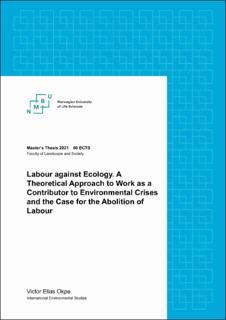| dc.description.abstract | The present ecological crises call for fundamental transformations of capitalist society. However, these calls seem to not include the transformation of labour as a social structure, only its technical aspects. To rectify this lack, this thesis contributes to developing a critique of labour and its mechanisms as a social relation from an ecological standpoint. This thesis investigates this question along three lines: first, the question of which aspects of labour drive ecological impact, and what drives aspects. Second, it considers the limits of policy approaches that do not change qualitatively labour itself. Third, it discusses the political implications from the preceding analysis. The approach is theoretical and uses existing literature to develop its arguments.
To build an understanding of labour and its impacts, I primarily use the one extant publication on this topic, that of Maja Hoffmann and Roland Paulsen, and give a revised version of their four factors of labour’s ecological impact – the time, scale, income and work-induced infrastructure and mobility factors. To better explain why these factors happen and propagate, I introduce Moishe Postone’s Marxist understanding of labour and value to show that as labour constitutes value, the dominant form of wealth, labour is driven by the a-ecological logic of value, and results in and drives the aforementioned factors.
The discussion of two current policy approaches, work time reduction and universal basic income, finds that as long as they only change labour’s quantities, such as the length of the working day, as opposed to its qualities, they can only temporarily lessen the impacts of labour. These approaches do not remove the dynamics of value and the aforementioned factors from labour.
Regarding political implications, the overall conclusion is that the abolition of labour is a necessary condition for sustainability, and that human productive activities should be organised in a different manner. The why and how production must change – the metabolism of humans and nature must be actively regulated, and production must happen for specific goals and not value. Production should conform to ecological rhythms, not uniform and abstract time norms. Productivity improvements should not be to the detriment of ecological integrity. Productive activity should not be subject to the wages system or something like it, wherein participation in production is necessary to gain the means of subsistence. These qualitative social changes must happen with and not instead of changes in technical aspects and the quantitative level of production. | en_US |

